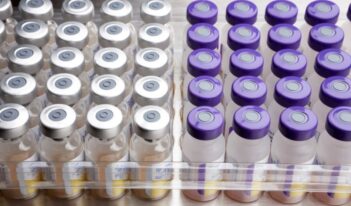
FDA faces mounting pressure from advocacy groups claiming a high chemical content in macaroni and cheese.
Every day in the United States, two million boxes of macaroni and cheese are sold. As COVID-19 leaves many Americans homebound, demand for this all-American comfort food has hit record levels.
But as consumers empty grocery store aisles, the U.S. Food and Drug Administration (FDA) continues to face mounting pressure from health and consumer advocacy groups worried about the lasting effects of the macaroni craze.
In 2017, the Coalition for Safer Food Processing and Packaging, an alliance of public health, environmental, and consumer advocacy groups, published a report that found high concentrations of phthalate chemicals in ten varieties of macaroni and cheese powders currently on the market.
Phthalates are a broad class of chemicals that are used to make plastic, and they have been historically detected in a wide variety of consumer products including nail polish, perfume, shampoo, detergent, and vinyl flooring. Phthalates have been called “everywhere chemicals” due to their presence in such a vast spectrum of products on the market.
Although not all phthalates pose substantial health risks, the phthalate found in macaroni and cheese, DEHP, is considered by some advocacy groups to be the “most widely banned phthalate around the world.” These bans stem from some research linking DHEP exposure to blocked production of testosterone, fertility complications, and even cancer.
So far, FDA has sent mixed signals on its view of phthalate risk in food. FDA has declined to make an official statement or ban these chemicals from use in manufacturing and food processing plants across the U.S.
In 2018, a group of FDA researchers concluded that “there have been no studies to date which show any connection between human dietary exposure to phthalates and adverse health effects.” But at the same time, the FDA website expresses uncertainty, stating “it’s not clear what effect, if any, phthalates have on human health.”
But some experts argue that the fears of phthalate exposure in macaroni and cheese are wildly overblown. They point to the fact that the amount of phthalate in a single macaroni and cheese box is miniscule, merely a biproduct of the manufacturing process in large plants.
Other critics of the Coalition’s report note that the group’s 2017 report was not peer-reviewed, and instead an “act of fact-based advocacy, as opposed to science.”
Many experts do agree, however, that phthalate exposure in the food supply as a whole poses substantial risks for certain populations. Phthalates are more regularly detected in foods with high fat content. Consumers who rely on packaged foods for a large portion of their diet—due to income constraints or poor proximity to a traditional grocery store—are at a higher risk of continuous phthalate exposure.
Amidst this debate, FDA faces increasing pressure to speak out more concretely. The agency is currently reviewing a petition from several prominent consumer rights groups, including the Natural Resources Defense Council, Clean Water Action, and Earthjustice, that funded the 2017 report. The petition asks FDA to “strike from its existing regulations its approval of 30 ortho-phthalates as food additives in food contact articles.” Two additional petitions have been filed seeking similar action.
Last month, FDA signaled it would soon publish a response in the Federal Register. This response was initially due, however, in September 2018.
The Centers for Disease Control and Prevention and the National Institutes of Health have been similarly silent on phthalate elimination in food. They maintain that “there is not enough data” to make an accurate assessment of the risks of phthalate exposure in food products.
In the absence of regulatory restrictions, Annie’s Homegrown, the popular, organic macaroni and cheese brand, has proactively made phthalate elimination a priority. This month, the company released a statement pledging its commitment to “work with our trusted suppliers to eliminate ortho-phthalates that may be present in the packaging materials and food processing equipment that produces the cheese and cheese powder in our macaroni and cheese.”
Kraft—the largest macaroni and cheese producer in the U.S.—has apparently not made any similar commitments thus far. Notably, eight of the nine Kraft samples included in the 2017 study contained phthalate traces.
As consumer advocacy groups document the risks of phthalate consumption, exert pressure on policymakers, and attract more media attention, producers outside of the macaroni and cheese market have started to make their own proactive pledges to eliminate the chemical from their packaging materials. In January, for example, Taco Bell released a statement detailing its commitment to eliminate phthalate traces in its packaging by 2025. And in 2020, Amazon banned phthalates from its Amazon Kitchen Brand packaging.
It remains an open question whether FDA will respond to such pressures anytime soon.



